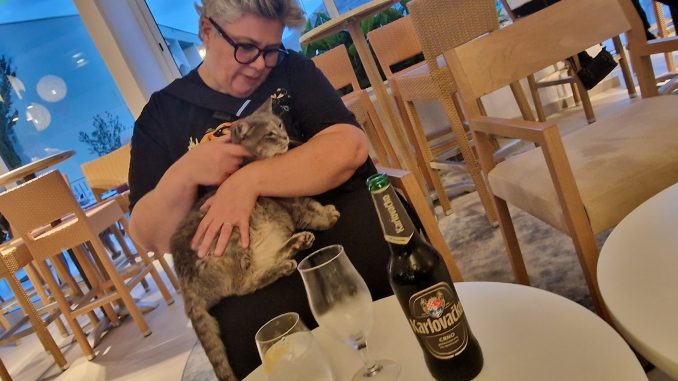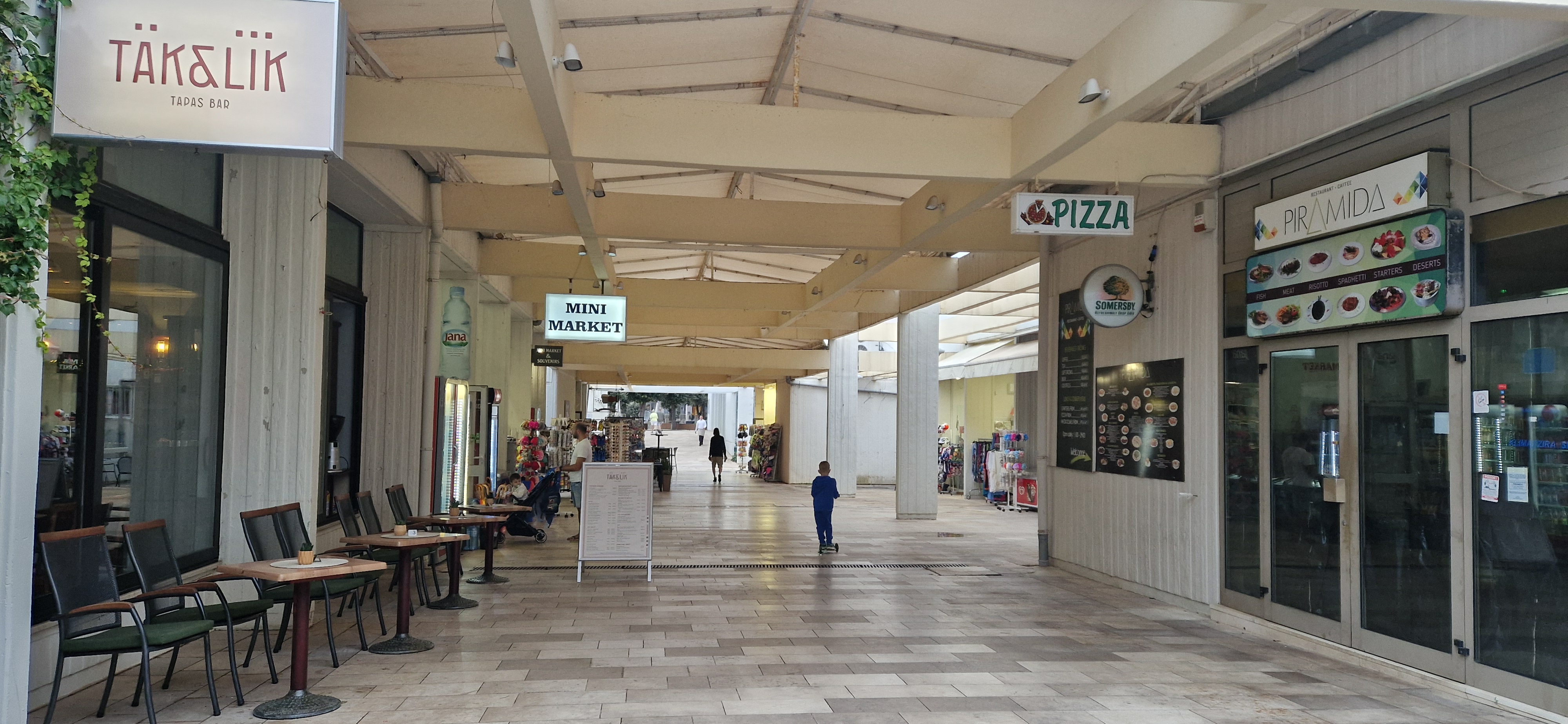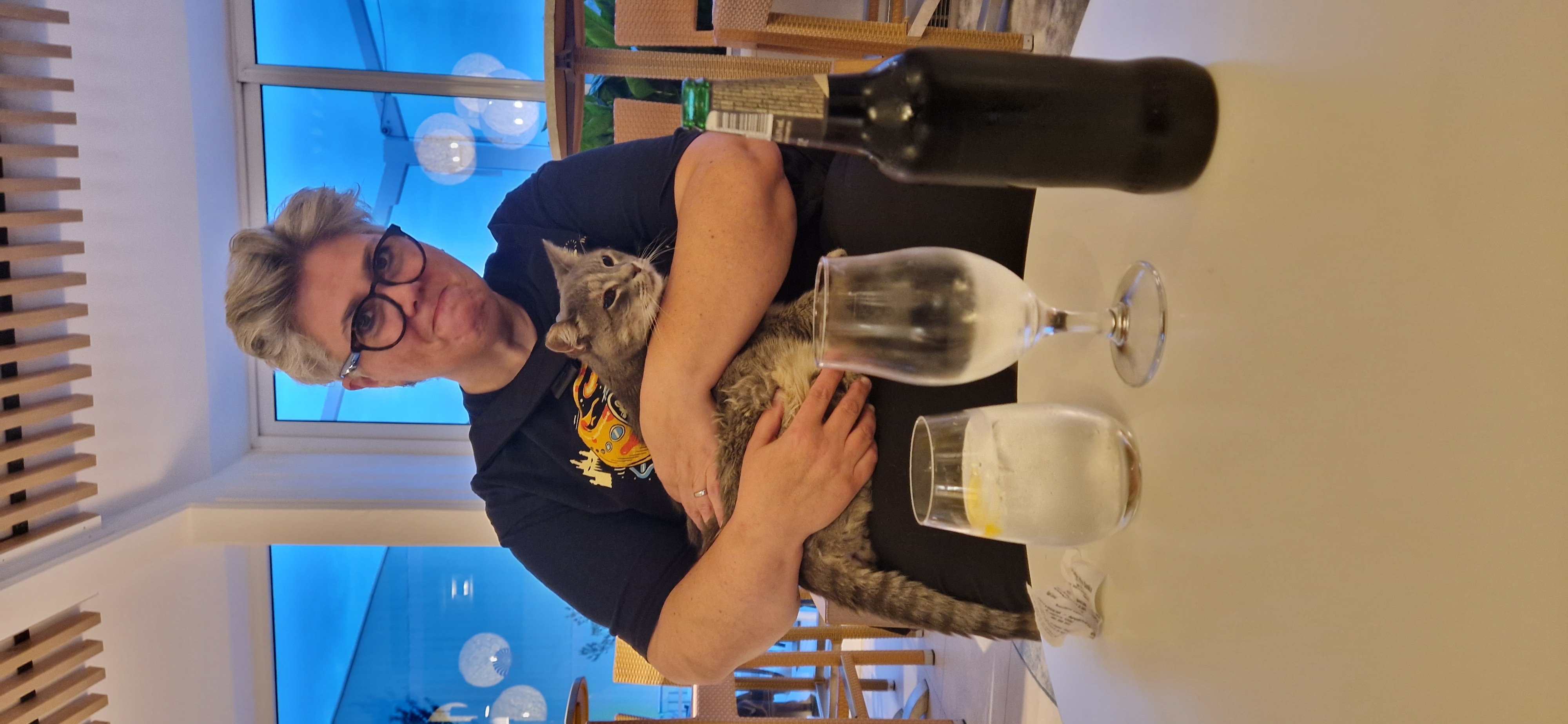
Today we did pretty much nothing at all, but I’m not going to let that stop me writing a blog.
The lack of sleep over the previous forty-eight hours, combined with probably one too many Karlovackos, resulted in a bit of a lie in this morning. Breakfast/Brunch/lunch is served till 1pm. We wander down around 11am and are confused at first. There seems to be a combination of traditional breakfast items and traditional lunch items out to choose from. We later work out that they stop serving breakfast at 11am and start serving lunch straight away. There’s the potential for interesting combinations during the change over, but few of them are vegetarian.
We had a walking tour booked in for today, but decided to rearrange. We are just knackered.
I look up TUI to see what sort of company we have trusted our honeymoon to. I’m sure they used to be something else, like Thomas Cook, but I’m not sure.
TUI AG (trading as TUI Group) is a German multinational leisure, travel and tourism company; it is the largest such company in the world. TUI is an acronym for Touristik Union International (“Tourism Union International”). TUI AG was known as Preussag AG until 1997 when the company changed its activities from mining to tourism. It is headquartered in Hanover, Germany
At one point it owned 25% of Thomas Cook, but had to sell 50% of those shares when it took over Thompson Travel.
They have 353 hotels with 275,144 beds and accommodate 21 million guests a year. It also operates 16 cruise ships under the TUI Cruises, Hapag-Lloyd Cruises and Marella Cruises brands, as well as a fleet of 134 aircraft. The polar opposite of the AirBnB we normally do, although that platform has come in for a lot of criticism lately, with it being accused of taking housing for local people off the market. It is hard work deciding which is the best approach for the ethical traveller.
After brunch we go for a wander. Our hotel is just one of several hotels all in one huge complex, all connected by a series of parks and there are several beaches around the coastal edge of the resort.
At the centre of it all there is a mini shopping precinct which is probably busy at the height of the season, but most shops are closed today. There’s a thing called Maro World, which appears to be a building full of activities for kids, like a ball-pool, a big slide thing and axe throwing. Dispite my reservations about this type of holiday, it is perfect for families with kids.
We find a pub that’s open though 😉
In the centre of the precinct there’s a guy with a stall selling day trips. I try to avoid eye contact but he talks to us anyway. After initially saying hello to be polite, we end up signing ourselves up for an island hopping cruise later in the week. We discuss the weather forecast and he makes sure we pick a day when it is due to be sunny. He advises us that in the summer it is always sunny, but with the thermometer often hitting 40 of the Celsius, this end of season period is better for us in more ways than one.
On the way up to the precinct, and back, we spot a number of stray cats. When we hit the bar, Megan sits down and almost immediately she has a stray cat sitting on her lap.
I look up Cats of Dubrovnik. It’s not something I’ve noticed in the research I’ve done, but it turns out it’s quite a thing. Apparently the issue is the absence of a culture of spaying cats, which is common in the UK. As a result, they breed like rabbits, or rather randy cats. Some will sustain injuries from punch ups with other wild cats, but on the whole locals are happy to put food out for them so they don’t starve. There’s much debate on the net about whether or not tourists should feed them. There are Facebook groups dedicated to the street cats and I found details of a government programme to neuter stray cats that has been running since 2018.
The cats appear to be welcome, or at least tolerated, in the hotel bar and even the restaurant. We go for dinner and in fairness there’s a wide variety of food available and it’s all well prepared, but no exciting veggie options jump out at us. We decide that if we are in town, we are not going to rush back to the hotel for food.
We opt for an early night so we can actually start a day fresh. We have just come back from a week in Iceland where we crammed as much as we physically could during our stay, but came home exhausted.
Tomorrow we are going on our rescheduled walking tour of the old town, and over the next few days we will start getting into the history of this magnificent city.
I’m fascinated by the history of this country, indeed the region, because modern Croatia has only been independent for thirty years, having been part of Yugoslavia from 1918 to 1992. I remember the Balkan war in the 1990s that led to the break up of Yugoslavia, but at the time it was difficult to follow. Indeed, it is difficult to get your head around now.
If you want to learn more, there are several sources I recommend.
- BALKAN GHOSTS: Robert D Kaplan. From the assassination that triggered World War I to the ethnic warfare in Serbia, Bosnia, and Croatia, the Balkans have been the crucible of the twentieth century, the place where terrorism and genocide first became tools of policy. Chosen as one of the Best Books of the Year by The New York Times and greeted with critical acclaim as “the most insightful and timely work on the Balkans to date” (The Boston Globe), Kaplan’s prescient, enthralling, and often chilling political travelogue is already a modern classic.
This new edition of the Balkan Ghosts includes six opinion pieces written by Robert Kaplan about the Balkans between 1996 and 2000 beginning just after the implementation of the Dayton Peace Accords and ending after the conclusion of the Kosovo war, with the removal of Slobodan Milosevic from power. - New Military Humanism- Lessons from Kosovo: Noam Chomky. Analyzing the Nato bombing campaign over Kosovo, Noam Chomsky poses questions about the New Humanism: Is it guided by power interests or by humanitarian concern? Is the resort to force undertaken in the name of principles and values, as professed? Or are we witnessing something more crass and familiar’.
- The Death of Yugoslavia: BBC Documentary: In depth but accessible explanation of how Yugoslavia fell apart. I can’t find it on BBC I Player, but it is available on YouTube.
- Tito’s Punks: Barry Phillips: Not strictly a history book, but it does provide a fascinating insight into the history of the region through the eyes of Balkan punks. In 1981, UK based band Demob released a single, No Room For You, that didn’t really set the world on fire in the UK, but it became a massive cult hit in Yugoslavia. Fast forward to 2011 bass player Barry Phillips gets a message advising him that the single was massive in the Balkans and had been covered by many bands. This sets in motion an adventure in which Barry travels all over the Balkans interviewing movers and shakers from the scene, looking at how the music scene developed and, inevitably, discussions about the fall of Yugoslavia from the point of view of punks that lived through it.
- This is Serbia Calling: Rock and Roll Radio and Belgrade’s Underground Resistance: Matthew Colin: This is the story of a courageous group of young people living under Milosevic’s repressive rule who waged a ten-year battle for freedom, armed only with a radio transmitter, some rock-n-roll records, and a dream of truth, justice and another kind of life. It’s a book about a group of idealists who started out wanting to play good music over the airwaves but had to negotiate two wars, economic sanctions, police violence and government crackdowns, armed gangsters and neo-Nazi politicians.
Clearly the last two are not definitive history books, but music lovers will find them interesting alternative views of the recent history of the region.
Tomorrow we will be up and at ’em early for a free walking tour of the old town, which we have found to be the perfect way to get to bearings and pick up historical pointers. And, no doubt, the location of the best pubs.

